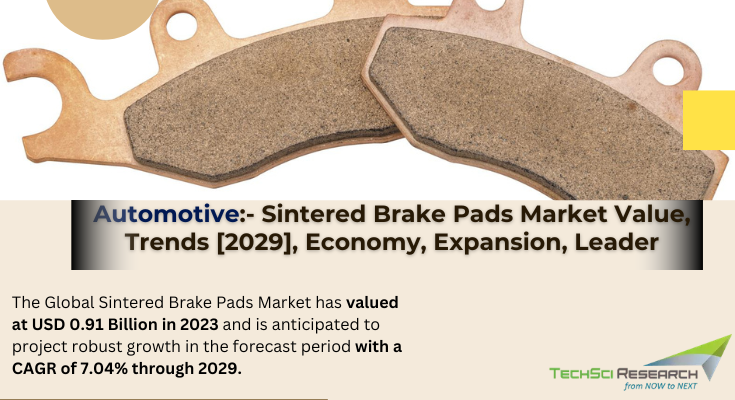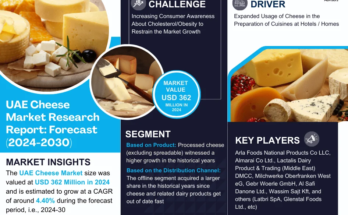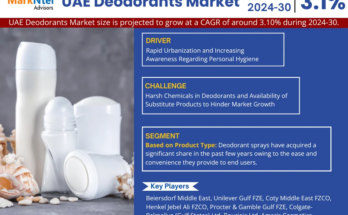According to TechSci Research report, “Global Sintered Brake Pads Market – Industry Size, Share, Trends, Competition Forecast & Opportunities, 2028”, the Global Sintered Brake Pads Market stood at USD 0.91 Billion in 2023 and is anticipated to grow with a CAGR of 7.04% in the forecast period, 2025-2029. The global sintered brake pads market is experiencing remarkable growth, fueled by the surging demand for high-performance vehicles and the rapid expansion of automotive industries in developing countries.
Sintered brake pads, which are meticulously crafted by fusing metallic particles under intense heat and pressure, exhibit exceptional durability, heat resistance, and overall performance compared to conventional brake pads. Furthermore, their superior braking capabilities in a wide range of weather conditions have made them the preferred choice for numerous vehicle manufacturers worldwide. As the automotive industry continues to evolve, the adoption of sintered brake pads is anticipated to further increase, driven by their outstanding quality and reliability.
Emerging economies, such as China and India, are experiencing a significant upsurge in their automotive sectors. This growth can be attributed to several factors, including rapid urbanization, improving living standards, and the expanding middle-class population. As a result, there is a notable increase in vehicle ownership, leading to a surge in demand for sintered brake pads. These brake pads, known for their durability and superior performance, are becoming increasingly popular among vehicle owners in these countries. The rising demand for sintered brake pads is driving the growth of the automotive aftermarket industry, creating new opportunities for manufacturers and suppliers in the sector.
In the global scene, Europe holds a significant share of the sintered brake pads market. This dominance can be attributed to the presence of major automotive manufacturers and stringent safety regulations within the region, enforcing the use of high-quality brake pads in vehicles.
Despite these positive trends, challenges in the sintered brake pads market cannot be overlooked. High production costs and the availability of cheaper alternatives have been hindering market growth. However, technological advancements, such as the development of innovative manufacturing processes and the use of advanced materials, leading to the production of highly efficient and cost-effective sintered brake pads, are expected to counter these challenges and drive market growth.
With continuous research and development efforts, manufacturers are striving to improve the durability, performance, and environmental sustainability of sintered brake pads, catering to the evolving demands of the automotive industry. As the market becomes more competitive, companies are focusing on enhancing product quality and expanding their distribution networks to reach a wider customer base. The sintered brake pads market is poised for growth, driven by a combination of factors such as increasing vehicle production, stringent safety regulations, and the growing demand for high-performance braking systems in various automotive applications.
The competitive landscape of the sintered brake pads market is quite robust, with key players focusing on strategies such as mergers and acquisitions, product innovations, and geographical expansion to maintain their market position. Some of the prominent players in the market include Brembo, Hawk Performance, EBC Brakes, and Akebono Brake Corporation.
Browse over market data Figures spread through 180 Pages and an in-depth TOC on the “Global Sintered Brake Pads Market” @ https://www.techsciresearch.com/report/sintered-brake-pads-market/22235.html
The Global Sintered Brake Pads Market operates at the forefront of automotive braking technology, playing a crucial role in meeting the demands of modern vehicles for enhanced performance, durability, and reliability. Sintered brake pads, composed of metal particles compacted under high pressure and temperature, have emerged as a preferred choice for various automotive applications, owing to their exceptional frictional characteristics and ability to withstand high-stress conditions.
A notable trend shaping the market is the increased adoption of sintered brake pads in high-performance and sports vehicles. Automotive enthusiasts and manufacturers alike recognize the significance of braking systems in achieving optimal vehicle performance. Sintered brake pads, renowned for their superior friction properties, deliver a level of braking performance that aligns with the expectations of drivers seeking precision and control, especially in high-stress situations. This trend underscores the pivotal role of sintered brake pads in the realm of high-performance vehicles, including sports cars and motorcycles designed for racing and off-road adventures.
Beyond the realm of sports and luxury vehicles, the Sintered Brake Pads Market is experiencing a notable expansion into heavy-duty and commercial applications. Traditionally associated with high-performance cars and motorcycles, sintered brake pads are increasingly finding favor in heavy-duty trucks, buses, and other commercial vehicles. The robust construction and enhanced durability of sintered brake pads make them well-suited for the demanding conditions faced by heavy-duty applications, contributing to their adoption in diverse vehicle categories. This expansion reflects the market’s versatility and its ability to address braking challenges across a broad spectrum of vehicles.
Continuous innovation in material composition and formulations is another trend shaping the Sintered Brake Pads Market. Manufacturers are investing in research and development to refine the mix of metal particles, explore alternative materials, and optimize the sintering process. These innovations aim to enhance the performance characteristics of sintered brake pads while addressing challenges such as noise, wear, and environmental impact. The quest for an optimal balance between performance, durability, and sustainability is driving advancements in brake pad formulations, positioning sintered brake pads as a cutting-edge solution in the evolving landscape of automotive braking systems.
Environmental sustainability is emerging as a pivotal consideration in the Sintered Brake Pads Market. With a heightened global focus on environmental issues, automotive components, including brake pads, are under increased scrutiny. Manufacturers are responding by incorporating eco-friendly practices and materials into their production processes. This includes minimizing the environmental impact of brake pad wear, exploring alternatives to traditional metals, and adhering to regulations that promote sustainability. The trend towards environmental responsibility positions the market at the forefront of providing braking solutions that align with evolving environmental standards and consumer preferences for eco-friendly automotive technologies.
An intriguing trend in the Sintered Brake Pads Market is the integration of smart technologies for performance monitoring and optimization. In the era of connected vehicles, brake systems are evolving to incorporate sensors and electronic control units (ECUs) within brake pads. These technologies enable real-time monitoring of brake pad conditions, including wear levels, temperature, and performance. The data collected can be communicated to the vehicle’s central system, providing drivers with insights into the health of their braking system. This proactive approach to maintenance aligns with the broader industry push towards connected vehicles, enhancing safety and prolonging the lifespan of braking components.
Despite these trends, the market faces notable challenges that require strategic considerations and ongoing innovation. Noise and vibration issues during braking pose a significant challenge, as the composition of sintered brake pads can contribute to increased noise levels, commonly known as brake squeal. Manufacturers must delicately balance achieving high friction levels for effective braking with mitigating the undesirable noise and vibration effects, addressing concerns related to user experience and consumer expectations for quiet and smooth braking performance.
Wear on brake rotors is another challenge encountered by the Sintered Brake Pads Market. The abrasive nature of the metal particles within sintered pads, while providing excellent friction properties, may contribute to accelerated wear on the braking surface of rotors. This challenge necessitates ongoing research to strike a balance between desired friction characteristics and minimizing rotor wear. Manufacturers must develop formulations that maximize pad life without compromising the longevity of brake rotor components, addressing concerns related to cost and overall system durability.
Additionally, there is a challenge related to the potential for increased brake dust generation. Sintered brake pads have been associated with the production of more brake dust compared to non-metallic alternatives. The market must explore solutions to reduce brake dust emissions and manage the environmental and aesthetic concerns associated with increased dust generation. This challenge underscores the importance of finding a balance between achieving high friction properties and minimizing the environmental impact of brake pad wear.
Cost considerations present a persistent challenge for the Sintered Brake Pads Market. While sintered brake pads offer superior performance, their production involves complex manufacturing processes and the use of advanced materials, contributing to higher production costs compared to conventional brake pads. This cost dynamic poses a challenge in terms of market adoption, as consumers may weigh the benefits of enhanced performance against the higher upfront costs. Manufacturers must effectively communicate the long-term value and durability of sintered brake pads, addressing consumer perceptions and emphasizing the overall cost-effectiveness over the lifespan of the braking system.
In conclusion, the Global Sintered Brake Pads Market operates at the intersection of performance, durability, and environmental responsibility within the automotive industry. The market’s response to trends such as increased adoption of high-performance vehicles, expansion into heavy-duty applications, innovations in material composition, a focus on environmental sustainability, and the integration of smart technologies reflects its dynamic nature. Despite facing challenges, the Sintered Brake Pads Market remains resilient, fostering continuous innovation to meet the evolving needs of consumers and contribute to the advancement of braking technologies across various automotive segments.
Major companies operating in the Global Sintered Brake Pads Market are:
- Akebono Brake Industry
- SBS Friction
- Tianyishangjia New Material
- Knorr-Bremse
- Tokai Carbon Miba
- KUMA Brakes
- CRRC Qishuyan Institute
- Wabtec
- Dawin Friction
- Ferodo
To Download FREE Sample Pages of this Report📥 @ https://www.techsciresearch.com/sample-report.aspx?cid=22235
Customers can also request for 10% free customization on this report.
“The Global Sintered Brake Pads Market stands at the forefront of automotive braking innovation, driven by the demand for high-performance solutions. Sintered brake pads, known for superior friction characteristics and durability, find increasing favor in diverse applications—from high-performance vehicles to heavy-duty and commercial settings. Amidst challenges such as noise and wear concerns, the market embraces continuous innovation, exploring smart technologies and eco-friendly formulations. As environmental sustainability gains prominence, the market remains adaptive, reflecting a commitment to delivering cutting-edge braking solutions. Positioned as a crucial component in the automotive industry, the Global Sintered Brake Pads Market navigates challenges while shaping the future of braking performance worldwide.” said Mr. Karan Chechi, Research Director with TechSci Research, a research-based management consulting firm.
“Sintered Brake Pads Market – Global Industry Size, Share, Trends, Opportunity, and Forecast, Segmented By Type (Road Sintered Brake Pads, Rail Sintered Brake Pads, And Wind Turbine Sintered Brake Pads), By Application (OEM And Aftermarket), By Region, Competition, 2019-2029”, has evaluated the future growth potential of Global Sintered Brake Pads Market and provides statistics & information on market size, structure and future market growth. The report intends to provide cutting-edge market intelligence and help decision-makers take sound investment decisions. Besides, the report also identifies and analyzes the emerging trends along with essential drivers, challenges, and opportunities in the Global Sintered Brake Pads Market.
You may also read:
Monorail Systems Market | [2029] Exploring Potential, Growth, Future & Trends
Automotive Crankcase Additives Market Analysis, Development [2029], Key Terms
Automotive Fuel Feed Pumps Market [2029] – Analysis, Trends, & Insights
Table of Content-Sintered Brake Pads Market
- Introduction
1.1. Product Overview
1.2. Key Highlights of the Report
1.3. Market Coverage
1.4. Market Segments Covered
1.5. Research Tenure Considered
- Research Methodology
2.1. Objective of the Study
2.2. Baseline Methodology
2.3. Key Industry Partners
2.4. Major Association and Secondary Sources
2.5. Forecasting Methodology
2.6. Data Triangulation & Validation
2.7. Assumptions and Limitations
- Executive Summary
3.1. Market Overview
3.2. Market Forecast
3.3. Key Regions
3.4. Key Segments
- Impact of COVID-19 on Global Sintered Brake Pads Market
- Global Sintered Brake Pads Market Outlook
5.1. Market Size & Forecast
5.1.1. By Value
5.2. Market Share & Forecast
5.2.1. By Type Market Share Analysis (Road Sintered Brake Pads, Rail Sintered Brake Pads, And Wind Turbine Sintered Brake Pads)
5.2.2. By Application Market Share Analysis (OEM And Aftermarket)
5.2.3. By Regional Market Share Analysis
5.2.3.1. Asia-Pacific Market Share Analysis
5.2.3.2. Europe & CIS Market Share Analysis
5.2.3.3. North America Market Share Analysis
5.2.3.4. South America Market Share Analysis
5.2.3.5. Middle East & Africa Market Share Analysis
5.2.4. By Company Market Share Analysis (Top 5 Companies, Others – By Value, 2023)
5.3. Global Sintered Brake Pads Market Mapping & Opportunity Assessment
5.3.1. By Type Market Mapping & Opportunity Assessment
5.3.2. By Application Market Mapping & Opportunity Assessment
5.3.3. By Regional Market Mapping & Opportunity Assessment
- Asia-Pacific Sintered Brake Pads Market Outlook
6.1. Market Size & Forecast
6.1.1. By Value
6.2. Market Share & Forecast
6.2.1. By Type Market Share Analysis
6.2.2. By Application Market Share Analysis
6.2.3. By Country Market Share Analysis
6.2.3.1. China Market Share Analysis
6.2.3.2. India Market Share Analysis
6.2.3.3. Japan Market Share Analysis
6.2.3.4. Indonesia Market Share Analysis
6.2.3.5. Thailand Market Share Analysis
6.2.3.6. South Korea Market Share Analysis
6.2.3.7. Australia Market Share Analysis
6.2.3.8. Rest of Asia-Pacific Market Share Analysis
6.3. Asia-Pacific: Country Analysis
6.3.1. China Sintered Brake Pads Market Outlook
6.3.1.1. Market Size & Forecast
6.3.1.1.1. By Value
6.3.1.2. Market Share & Forecast
6.3.1.2.1. By Type Market Share Analysis
6.3.1.2.2. By Application Market Share Analysis
6.3.2. India Sintered Brake Pads Market Outlook
6.3.2.1. Market Size & Forecast
6.3.2.1.1. By Value
6.3.2.2. Market Share & Forecast
6.3.2.2.1. By Type Market Share Analysis
6.3.2.2.2. By Application Market Share Analysis
6.3.3. Japan Sintered Brake Pads Market Outlook
6.3.3.1. Market Size & Forecast
6.3.3.1.1. By Value
6.3.3.2. Market Share & Forecast
6.3.3.2.1. By Type Market Share Analysis
6.3.3.2.2. By Application Market Share Analysis
6.3.4. Indonesia Sintered Brake Pads Market Outlook
6.3.4.1. Market Size & Forecast
6.3.4.1.1. By Value
6.3.4.2. Market Share & Forecast
6.3.4.2.1. By Type Market Share Analysis
6.3.4.2.2. By Application Market Share Analysis
6.3.5. Thailand Sintered Brake Pads Market Outlook
6.3.5.1. Market Size & Forecast
6.3.5.1.1. By Value
6.3.5.2. Market Share & Forecast
6.3.5.2.1. By Type Market Share Analysis
6.3.5.2.2. By Application Market Share Analysis
6.3.6. South Korea Sintered Brake Pads Market Outlook
6.3.6.1. Market Size & Forecast
6.3.6.1.1. By Value
6.3.6.2. Market Share & Forecast
6.3.6.2.1. By Type Market Share Analysis
6.3.6.2.2. By Application Market Share Analysis
6.3.7. Australia Sintered Brake Pads Market Outlook
6.3.7.1. Market Size & Forecast
6.3.7.1.1. By Value
6.3.7.2. Market Share & Forecast
6.3.7.2.1. By Type Market Share Analysis
6.3.7.2.2. By Application Market Share Analysis




